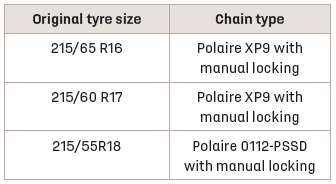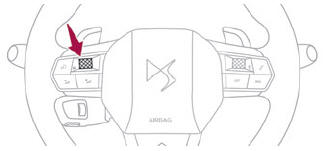DS 3: Practical information / Snow chains
In wintry conditions, snow chains improve traction as well as the behaviour of the vehicle when braking.
 Snow
chains must be fitted only to the
front wheels. They must never be fitted to
"space-saver" type spare wheels.
Snow
chains must be fitted only to the
front wheels. They must never be fitted to
"space-saver" type spare wheels.
 Observe the legislation in force in your
country relating to the use of snow chains
and maximum authorised speeds.
Observe the legislation in force in your
country relating to the use of snow chains
and maximum authorised speeds.
Use only chains designed to be fitted to the type of wheel fitted to the vehicle:

For more information on snow chains, contact a dealer or a qualified workshop.
Installation tips
- To fit the snow chains during a journey, stop the vehicle on a flat surface at the side of the road.
- Apply the parking brake and position any wheel chocks under the wheels to prevent movement of the vehicle.
- Fit the snow chains following the instructions provided by the manufacturer.
- Move off gently and drive for a few moments, without exceeding 31 mph (50 km/h).
- Stop the vehicle and check that the snow chains are correctly tightened.
 It is
strongly recommended that you
practise fitting the snow chains on a level
and dry surface before setting off.
It is
strongly recommended that you
practise fitting the snow chains on a level
and dry surface before setting off.
 Avoid
driving with snow chains on roads
that have been cleared of snow to avoid
damaging the vehicle's tyres and the road surface. If the vehicle is fitted with
alloy
wheels, check that no part of the chain or its
fixings is in contact with the wheel rim.
Avoid
driving with snow chains on roads
that have been cleared of snow to avoid
damaging the vehicle's tyres and the road surface. If the vehicle is fitted with
alloy
wheels, check that no part of the chain or its
fixings is in contact with the wheel rim.
 Roof racks
Roof racks
As a safety measure and to
avoid
damaging the roof, it is essential to use
transverse roof bars approved for your vehicle.
Observe the instructions on fitting and use
contained in the guide supplied with the roof
bars...
 Energy economy mode. Load reduction mode
Energy economy mode. Load reduction mode
Energy economy mode
This system manages the duration of use of
certain functions, in order to conserve a sufficient
level of charge in the battery with the ignition off...
Other information:
DS 3 2016-2026 Owners Manual: Manual and Automatic operation
Manual operation Manual release With the ignition on or engine running: Press the brake pedal. While maintaining pressure on the brake pedal, briefly push the control. If the brake pedal is not depressed, the parking brake is not released and a message is displayed...
DS 3 2016-2026 Owners Manual: Media
Selecting the source Press the "Media" menu. Press the "SOURCE" button. Select the source (USB, Bluetooth or AUX, depending on equipment). USB port Insert the USB memory stick into the USB port or connect the USB device to the USB port using a suitable cable (not supplied)...
Categories
- Manuals Home
- 1st Generation DS 3 Owners Manual
- 1st Generation DS 3 Service Manual
- Activation/Deactivation
- Orange warning/indicator lamps
- Service indicator
- New on site
- Most important about car
Choosing the display mode
In each mode, specific types of information are displayed on the instrument panel.

